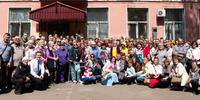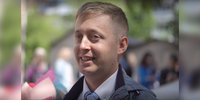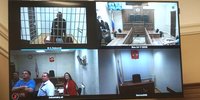The Case of Kazadaev in Barnaul
Filter
- #
Evgeny Kozyuchenko, senior investigator of the first department of the Investigative Directorate of the Investigative Committee for the Altai Territory, is initiating a criminal case against 24-year-old Pavel Kazadaev. The investigation interprets the discussion of the Bible among friends as participation in the activities of an extremist organization.
- #
During a police special operation called "Armageddon", security forces broke into the apartment of the Kazadaev spouses in Novokuznetsk (Kemerovo region) in the early morning. The search is also taking place in the village of Lugovoi, at the place of registration of Pavel, where his relatives live. In addition to the house, law enforcement officers search the garage, car, bathhouse and yard. After that, Pavel and his wife were taken to Barnaul, 350 km from home. The believer is detained and sent to a temporary detention facility.
Investigator Yevgeny Kozuchenko charges Pavel Kazadaev with committing a crime under Part 2 of Article 282.2 of the Criminal Code of the Russian Federation. The resolution notes that Kazadaev, "being an active participant in an extremist organization, carried out actions to support the existence of the assembly in the Altai Territory, including through conversations."
At 6 a.m., seven operatives come to search the Reshetnikov spouses. Law enforcement officers behave respectfully, sometimes asking permission to search a particular place. Security forces seize electronic devices, wedding cards and personal records.
Then Mikhail and his wife are taken away for interrogation to the local FSB. He is given the opportunity to consult with a public defender. Investigator Vladimir Strigunenko offers Mikhail Reshetnikov cooperation. The believer uses Article 51 of the Constitution of the Russian Federation.
- #
Investigator Kozuchenko petitions the court for the election of a measure of restraint for Pavel in the form of house arrest. The court, however, places the believer under a recognizance agreement.
- #
The criminal case against Pavel Kazadaev is submitted to the Industrial District Court of Barnaul, Altai Territory. Referee — Dmitry Malikov.
- #
About 80 people come to the courthouse, only the wife of Pavel Kazadaev and another listener who plans to join the case as a public defender are allowed into the courtroom.
The prosecutor reads out the charges. The judge asks her to pronounce the name "Jehovah's Witnesses" correctly. Kazadaev expresses his attitude to the charges.
The judge satisfies the defense's requests for publicity of hearings and personal examination of witnesses.
- #
Approximately 80 people come to the courthouse. The defendant's wife and father are allowed into the courtroom. The court grants the request for the involvement of a public defender. Witness Rozhnov, an employee of the Department of the Ministry of Internal Affairs of the Russian Federation for Countering Extremism, is being interrogated.
Answering the questions of the prosecution, the witness almost completely quotes his testimony given to the investigator. The defense asks clarifying questions about which actions of the defendant are considered extremist. The witness either finds it difficult to answer or refers to the case file.
- #
A prosecution witness who turned to Pavel Kazadaev for equipment repair services is being interrogated. He characterizes him as a conscientious worker.
The prosecutor asks the witness provocative questions, in particular, how the teachings of Jehovah's Witnesses differ from other religions, such as Orthodoxy. The witness refuses to answer them, saying that he is not an expert. He also confirms that Kazadaev has never made any extremist statements, as well as calls to undermine the foundations of the constitutional order and state security.
The witness explains that Kazadaev could not be one of the founders of the local religious organization of Jehovah's Witnesses, since it was created in the years when Pavel was still a child.
- #
Only the defendant's wife and father are allowed into the courtroom. Approximately 55 people remain on the street.
A prosecution witness who attended Jehovah's Witnesses services before 2018 is being questioned. He characterizes the defendant on the positive side. The man claims that believers can practice the religion of Jehovah's Witnesses without becoming members of a local religious organization. He confirms that he did not hear from the defendant any inducement to break off family relations, a negative assessment of persons who are not Jehovah's Witnesses, or calls to undermine the foundations of the constitutional order.
- #
Due to the failure of prosecution witnesses to appear, the court begins to examine the case materials. The prosecutor reads out the first volume.
- #
The head of the department of the Center "E", Yaroslav Medvedev, is being interrogated. He says that believers were under surveillance, and their telephone conversations were tapped.
From his words, it becomes clear that the witness has false information: for example, he believes that the Administrative Center of Jehovah's Witnesses in Russia, liquidated in 2017, is located in the United States.
Medvedev confirms that the Constitution of the Russian Federation does not prohibit professing the religion of Jehovah's Witnesses, while expressing the opinion that its followers "deserve severe punishment."
- #
The prosecutor reads out volumes two to four of the case. In the second volume, reading out the lists of founders of the LRO of Jehovah's Witnesses "Barnaul", he draws attention to the fact that Kazadaev is not on these lists.
- #
34 people come to support the believers, but four are allowed into the hall. The rest are standing on the street, despite the 25-degree frost.
The court examines the materials of the case: the seventh and eighth volumes. The prosecutor reads out the conclusions of the examinations.
- #
A specialist, Candidate of Philological Sciences Pavel Manyanin, is being interrogated. He says that he has no knowledge of religious studies, so he answers questions regarding the meanings of individual words and phrases. He is not familiar with the defendant.
When asked whether there is a sign of exclusivity in the religion of Jehovah's Witnesses, the expert says that it is not in his competence to give a legal interpretation. And when asked who is meant by Jehovah's organization, a legal body or people, he answers: "People."
- #
Interrogation of expert M. V. Kashchaeva, candidate of historical sciences. When asked by the defense, she admits that the Supreme Court of the Russian Federation, having banned legal entities, did not ban the religion of Jehovah's Witnesses itself. The expert agrees that this decision does not restrict the rights of believers to hold joint worship services, deliver sermons, prayers, sing spiritual songs and discuss sacred texts. According to Kashchaeva, all these actions are a legitimate way for Jehovah's Witnesses to express their religious beliefs.
When asked whether there are statements of an extremist nature in the audio recordings of Jehovah's Witnesses services heard by the court, the expert answers in the negative.
- #
About 25 people come to the courthouse to support Pavel Kazadaev. The court examines the materials of the case. The prosecutor reads from the 12th to the 15th volumes of the case.
- #
Excerpts from the recordings of divine services are reproduced in court. On the audio, believers can be heard discussing biblical issues and deciding when they will meet next.
- #
Approximately 45 people gather outside the courthouse to support the defendant. The judge attaches to the case file the characteristics of Pavel Kazadaev.
- #
The prosecutor requests a punishment for the believer: 3 years in a general regime colony and 1 year of restriction of freedom. More than 60 people come to support the believer, only five are allowed into the hall.
- #
Pavel Kazadaev makes his final statement. "Basically, the state wants me to renounce my faith," he says. "How, then, can I practice my religion in accordance with the Constitution?"
The last word of the defendant Pavel Kazadaev in Barnaul - #
- #
Pavel Kazadaev is taken from the pre-trial detention center to correctional colony No. 5 in Rubtsovsk (Altai Territory), to serve time for his faith. He can write letters.
- #
Pavel Kazadaev is being held in the same colony as Anton Olshevsky, Aleksandr Putintsev and Aleksandr Seredkin. Kazadaev and Olshevsky were sent to the punishment cell immediately after quarantine. The period of their stay there is constantly extended for formal reasons - in IK-5 there are internal rules according to which Jehovah's Witnesses should be held only in strict conditions and at the same time should not communicate with each other.
At the same time, believers have good relations with the colony staff and prisoners - they are respected for their decency and honesty.
Although the letters arrive to the prisoners with a delay, Pavel has already received more than 200 pieces. He has his own Bible. Recently, he had a long date with his wife.
- #
Pavel Kazadaev was placed in a PKT (chamber-type room) until January 3, 2024. Prior to that, he ended up in the punishment cell three times due to various penalties.
The believer is kept alone in the cell. At 5 o'clock in the morning, he hands over the mattress, which is returned at 21:00. He is allowed to write and receive letters, he can take daily walks and buy groceries in the colony's store. However, according to the conditions of detention, the believer is prohibited from visits and phone calls.
- #
- #
Pavel Kazadaev is in strict conditions of detention. The barracks, where 13 people live, are clean and warm. After breakfast, there is an opportunity to go for a walk. Pavel tries to play sports in order to stay in good physical and emotional shape.
Kazadaev maintains long visits with his wife, which take place every four months. Recently, at one of them, the couple celebrated five years of marriage. Daria shares: "I really wanted to keep warm memories of this day, despite the conditions. During the inspection, the officers noticed that I had taken a dress for myself and a shirt for my husband, and asked why. I explained to them that we wanted to celebrate our wedding anniversary."
- #
Pavel Kazadaev is still under strict conditions. There are 19 people in the unit; the attitude toward the believer on the part of prisoners and penal colony staff is respectful. He has been put in charge of the storeroom — he is responsible for issuing and accepting clothes and personal belongings of inmates. Pavel regularly receives letters of support.



